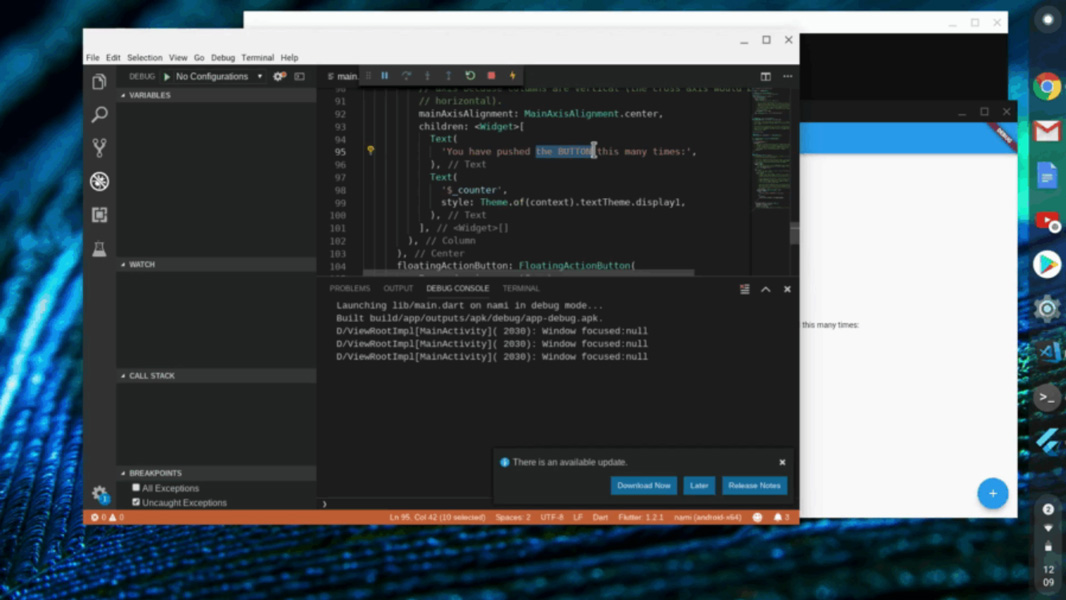You Can Create Flutter Apps on Chrome OS
- Paul Thurrott
- May 13, 2019
-
18

Thanks to its Linux compatibility, you can now write software on Chrome OS. Including, apparently, using Flutter and Android Studio.
“The latest Flutter release adds support for building beautiful, tailored Chrome OS applications, including rich support for keyboard and mouse, and tooling to ensure that your app runs well on a Chromebook,” a new Google Developers post explains. “Furthermore, Chrome OS is a great developer workstation for building general-purpose Flutter apps, thanks to its support for developing and running Flutter apps locally on the same device.”
Windows Intelligence In Your Inbox
Sign up for our new free newsletter to get three time-saving tips each Friday — and get free copies of Paul Thurrott's Windows 11 and Windows 10 Field Guides (normally $9.99) as a special welcome gift!
"*" indicates required fields
A. Great. Developer. Workstation.
That’s probably a bit of a stretch, as most Chromebooks, even those with reasonably modern processors, tend to ship with far less RAM and storage than an otherwise similar PC. But I do admit to a certain fascination with this topic, and I find it interesting that Google suddenly seems to be pushing software development on Chromebook more aggressively.
As for Flutter mobile app development, you’ll need a few things before you can get started, regardless of which platform you choose, including a developer IDE like Android Studio or Visual Studio Code and the Flutter SDK. Installing these on Windows and Mac is relatively straightforward, and both Android Studio and Visual Studio Code have internal tools for installing support for both Flutter and the Dart programming language it uses. But it’s a bit more complex on Chrome OS.
OK, it’s a lot more complex.
The nice thing about Chrome OS, the thing that makes it kind of interesting as a developer system, is that it can run Android apps natively. So, it’s possible to develop Android apps using Flutter and then just run them right there in Chrome OS next to Android Studio. Flutter has even been updated to warn of issues that are specific to Android apps running on Chromebook.
That’s all well and good. But the problem with this approach is that you must first enable developer mode on your Chromebook. Doing so will wipe out whatever user data you’ve added to the device—on Chromebooks, this includes everything associated with a user account, including installed apps—and then disable OS verification. So you’ll see a nasty warning every time you boot it up.
Once you get past that and re-sign-in to the Chromebook, you can enable support for Linux (Beta) in Settings and then install Android Studio and get started.
I’ve not yet tried this, but I’m intrigued in a vaguely geeky, but this is pointless, kind of way. Honestly, I’m more interested in a solid photo editing tool at this point. But with software development becoming a mainstream activity, of sorts, on Chromebook, it appears that virtually any limitation will be erased eventually. Microsoft can’t make EdgeBook happen quickly enough.
Tagged with
Conversation 18 comments
-
skane2600
<p>As I've said before if Google really wants to jump-start flutter development they need to get Java out of the development process. </p>
-
skane2600
<blockquote><em><a href="#427756">In reply to longhorn:</a></em></blockquote><p>I'm not an expert on Flutter but I know it's intended to run on more OS's than just Android. If you removed the Java virtual machine you'd have a linux kernel, but it wouldn't be linux in the sense of a working Linux system. But my point was that if you want to provide an alternative way to develop software without Java, java should not be required as part of the build process.</p>
-
skane2600
<blockquote><em><a href="#427799">In reply to longhorn:</a></em></blockquote><p>I'm not sure.</p>
-
skane2600
<blockquote><em><a href="#427891">In reply to Pungkuss:</a></em></blockquote><p>Thanks for the information.</p>
-
skane2600
<blockquote><em><a href="#427917">In reply to curtisspendlove:</a></em></blockquote><p>It would be great to get Android Studio or any other Java stuff out of the process. IMO Android Studio like Eclipse before it seemed always more focused on customization and bells and whistles than on reliability and good performance. </p>